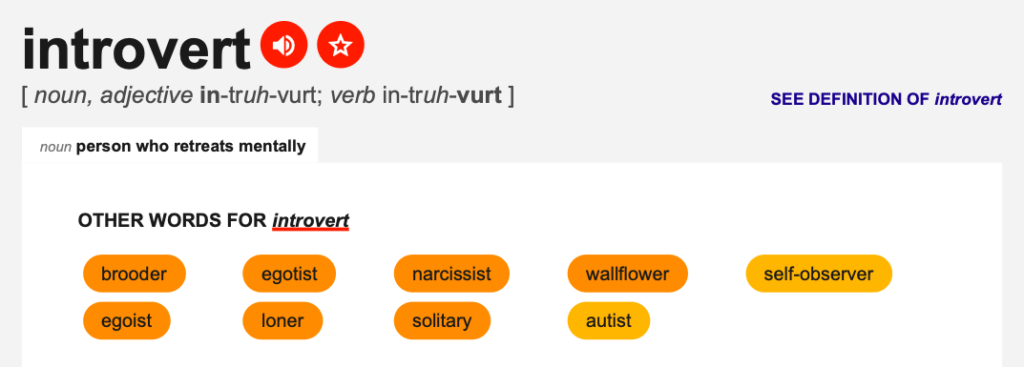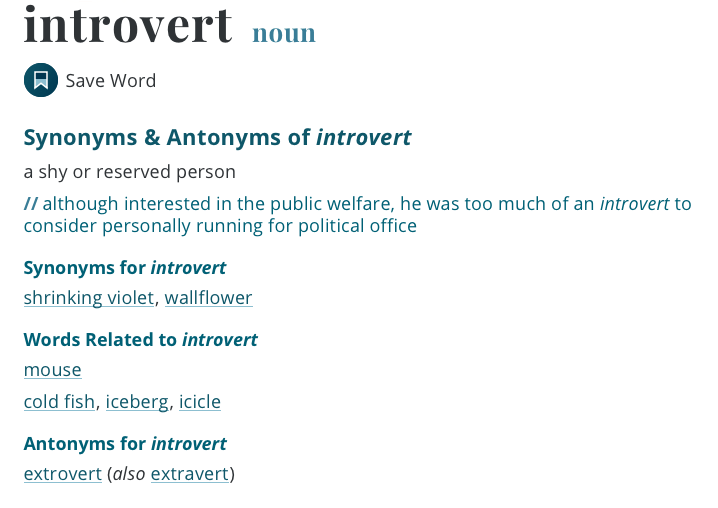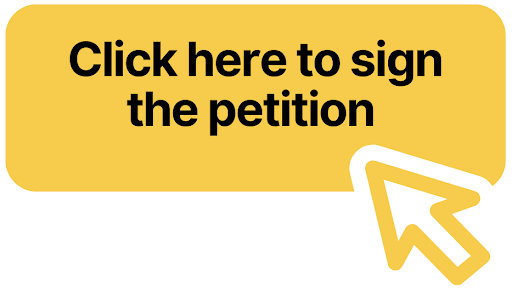How the Dictionary Definition of ‘Introversion’ Harms Introverts

Dictionaries and thesuaruses are using words like “narcissist, egotist, mouse, and icicle” as synonyms for “introvert.” Sign the petition to change that.
My mother sensed I was different. She only knew to keep nudging me outside for hours to play with neighbors. Kickball was fun for a while, but I was soon craving my “hobby time,” deep in my closet, alone. I didn’t think there was anything wrong with me. I liked my time alone. I was a pretty happy young kid.
However, as a preteen, I could also sense I was the source of my parents’ worry. I didn’t know why. Perhaps it was the grimace of concern on my mother’s face if I stayed in all day while my older sisters played outside and chatted with their friends on the phone.
Later I could hear schoolyard cliques around me wondering why I was “so distant, so weird, so different.” Soon, those same words rattled around in my own head. I yearned for time alone. It was peace to me, a release of all anxiety and fear, yet I had become conditioned to feel guilty of this solitude.
This guilt drove me away from others. I found making friends stressful and any social time draining. Without the understanding and support of my parents, my self-confidence spiraled downhill. As a kid in my formative years, I somehow began to believe I was not “normal.”
Throughout my teenage years, those words continued to haunt me. During class and any lunch hour or play groups, the words reminded me of my inadequacies. Even at thirteen, I turned to alcohol to dull the pain and provide me with the hubris to escape reality and survive social situations.
As an adult, my dependence on alcohol, coupled with my binge-eating, worsened as the call to socialize and debate all day at work wore on me.
My determination to provide for my family pushed me to rise to the escalating work challenges at the expense of my health and wellbeing. I was exhausted, depressed, and afraid.
Finally, in my late forties, I realized I was in an untenable situation. I had to make significant life changes. I found the support I’d needed to learn about myself through therapy, Susan Cain’s revolutionary book, Quiet, and the introspective process of writing my own memoir, In Search of Courage. I began to understand I was no more “different” than the 30-50 percent of the population who identify as introverts. Over time, I discovered my strengths and rebuilt my confidence, but it took me years to repair the damage of my childhood and to rid myself of those horrible words from decades earlier.
It’s Time to Rewrite Our Story
Now, I’m enjoying my new lease on life writing introspectively, connecting with other introverts, and hoping to inspire others to overcome their own fear and champion their best selves.
As I craft my weekly blog or other writings, I have occasion to consult online dictionaries and thesauruses — like Merriam-Webster and Thesaurus.com — in search of the right word for the moment. Sometimes, I peek into the synonyms for “introvert.” Yet when I do so, I’m reminded of the horrible words that were so ingrained in my life.
These words are just wrong. They always have been. Everyone, introvert and extrovert, may be reserved and quiet at times, but terms like “narcissist, egotist, brooder, recluse, hermit, mouse, icicle, and shrinking violet” are not only insulting to introverts, they’re also just plain wrong.
Listing “autist” and “shy” as synonyms for introversion just shows the dictionaries’ ignorance. Introversion is an inherent personality trait — it’s likely part of our DNA — and characteristics of introversion are seen shortly after birth.
Autism, on the other hand, is a life-long condition characterized by “challenges with social skills, repetitive behaviors, speech and nonverbal communication,” according to Autism Speaks. Shyness is related to social anxiety, and it can be managed and mitigated through practice. Sure, some introverts are shy, but some extroverts are shy as well. Why can’t these online resources get it right, and in doing so, help the world better understand who introverts really are?
What really amazes me is the antonym or opposite of “introvert” is “extrovert” — fair enough. But when we use this same tool to look up synonyms for extrovert, we see words like “sociable, outgoing, gregarious, friendly, befriender, and outgoing person.” How did these resources gain such authority to deem extroverts with positive traits and relegate introverts to the depths of negativity?
You can thrive as an introvert or a sensitive person in a loud world. Subscribe to our email newsletter. Once a week, you’ll get empowering tips and insights. Click here to subscribe.
The Problem Is Not That We Are Introverts
Let’s be clear: The struggle most introverts have endured (including myself) is not that we are introverts, but that we have to deal with the stereotypes that many of our friends, family, coworkers, and managers have bought into and assume are true. This impacts their perceptions of us but also may dissuade introverts from taking risks and putting themselves “out there” in meaningful ways.
Especially in the past decade, introverts have undergone a renaissance or reawakening of sorts. Now more than ever, introverts are learning about what introversion really means and discovering and embracing their amazing strengths. Many introverts are stellar listeners, creatives, world-class planners, caring and empathetic, loyal confidantes, and avid learners — which is why we celebrate them on World Introvert Day (Jan. 2)!
Introverts are done hiding. We are tossing away the masks we’ve worn at work and in social circles and exerting our strengths. We are getting our voices into the meeting room and social hall.
Even today, as I proclaim my introversion at book events and on podcasts, I see people literally pull back from conversations as they offer their condolences. For example, I was on the Workplace Perspective podcast recently with an absolutely lovely hostess. One of the first things she shared with the audience when she introduced me as her guest was that she “never would have guessed [I’m] an introvert!” I suppose my ability to socialize, smile, and intelligently converse seemed too extroverted. We laughed about it and had a great discussion, yet it underscores the work ahead.
Sign the Petition to Change the Definition of Introversion
These are the challenges introverts still face today. Yet I believe the “quiet revolution,” as Susan Cain puts it, is empowering us to be bold, stand tall, and fight back. Oh, we may not openly debate, but we can share a more accurate definition of introversion:
Introvert: a person who generally prefers calm, minimally stimulating environments and feels energized when spending time alone. Introverts are often very reflective, observant, empathetic, and loyal. They tend to enjoy solo activities including reading, creative hobbies (art, writing, needlepoint, etc.), and exercise.
Introvert (synonyms): reflective, observant, empathetic, loyal, and creative.
It is important to right these wrongs. The current definition stands as a reminder of the pain of the past for so many introverts. They may contribute to delaying the renaissance of today’s young introverts, and they surely don’t dispel the myths so many in society have propagated for generations. Introvert, Dear and Beyond Introversion have partnered to end this injustice. Join us by signing our petition here. We will be submitting our case in the first quarter. Stay tuned for updates on both platforms. ![]()
You might like:
- If You Relate to These 21 Signs, You’re an Introvert
- Can You Stop Being an Introvert? Probably Not, According to Science
- Why Is Socializing Exhausting for Introverts? Here’s the Science
We participate in the Amazon affiliate program.



